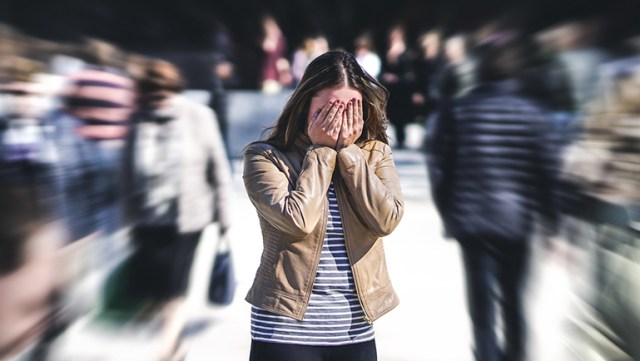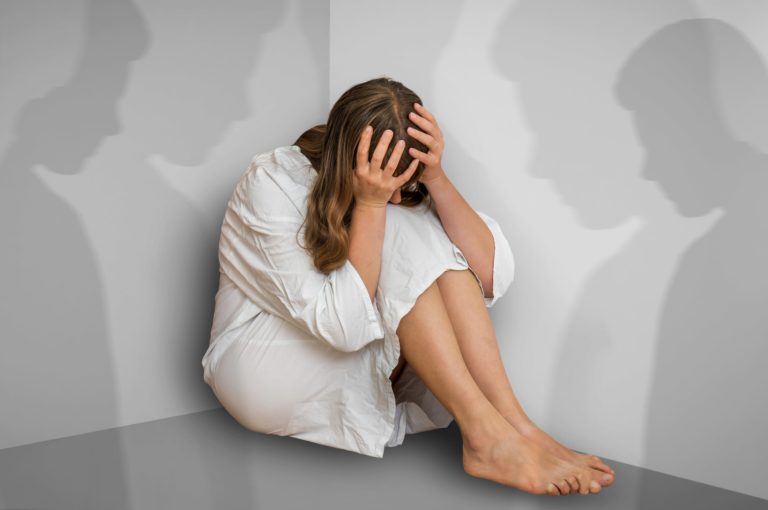Shy children can grow up to be gregarious, outgoing adults. But what happens if a young person isn’t just introverted or reserved, but instead experiences severe anxiety when interacting with other people? Will this condition naturally improve, or does social anxiety get worse with age?
What Is Social Anxiety?
Before we address the question, does social anxiety get worse with age, let’s take some time to clarify exactly what we’re talking about when we talk about this condition.
Social anxiety is a metal health disorder that is characterized by extreme fear or excessive worry about being in social situations where you could be scrutinized or judged by others. As established in the fifth edition of the Diagnostic and Statistical Manual of Mental Disorders (DSM-5), the clinical terms for this condition are social anxiety disorder or social phobia.
According to the National Institute on Mental Health (NIMH), the lifetime rate of social anxiety among adults in the United States is 12.1%. The past-year prevalence of this disorder is 7.1% (8.0% for adult women and 6.1% for adult men). This means that, in a typical year, more than 18 million adults in the U.S. experience symptoms of social anxiety.
What Does Social Anxiety Feel Like?
Social anxiety can affect different people in different ways, but the common symptom among all who have this disorder is intense distress when in certain social situations (or even when thinking about certain social situations).
Here are a few examples of what social anxiety can look and feel like:
- Fearing that you will act in a manner that will cause you to be humiliated, embarrassed, and/or rejected by other people.
- Turning down projects or promotions at work because you would be required to give presentations, speak to large groups, or frequently interact with new people.
- Declining invitations to go out to dinner because you abhor the thought of eating in an environment where others can watch you.
- Refusing to shake hands with other people because you sweat when you’re nervous and you fear that your hands would reveal your anxiety.
- Being hesitant or unwilling to meet new people because you are afraid that you will accidentally blurt out something that is offensive, embarrassing, or otherwise inappropriate.
- Self-medicating with alcohol or other drugs to calm or numb yourself before social situations that you are unable to avoid.
Does Social Anxiety Get Worse With Age?
Does social anxiety get worse with age? This is posed as a simple yes/no question, but – as is so often the case in discussions of mental illnesses – the answer can be a bit more complex.
First, knowing that the symptoms and effects of social anxiety disorder can vary from one person to the next, it would be misguided to assume that the progression (or regression) of this condition would be uniform. In other words:
- Does social anxiety get worse for some people? Without a doubt.
- Does social anxiety get worse for everyone? Absolutely not.
Here’s what the publication Social Anxiety Disorder: Recognition, Assessment and Treatment has to say about the onset and progression of social anxiety symptoms:
- Most people who develop social anxiety disorder first experience symptoms in their early to middle teens. However, it is definitely possible for children to exhibit signs of this condition.
- It is not unheard of for young people to “grow out of” their struggles with social anxiety – though these individuals may retain a higher than average risk of developing other anxiety disorders.
- Among people who continue (or start) to experience social anxiety symptoms in adulthood, the condition is unlikely to improve without appropriate professional intervention.
- One community study found that, over a 12-year period, 82% of adults with panic disorder and 58% with generalized anxiety disorder recovered. However, among adults with social anxiety, the recovery rate was only 37%.
Other experts have suggested that, as people age, they become more effective at avoiding circumstances that might trigger the symptoms of social anxiety disorder. This suggests that the disorder does not improve, even though some people are able to minimize its impact on their daily lives by adapting their behaviors.
To summarize: For adults, social anxiety may not always worsen over time, but it is unlikely to get much better without treatment.
How Is Social Anxiety Treated?
Treatment for social anxiety disorder often includes a combination of medication and therapy.
When prescription medications are incorporated into treatment, most doctors begin with antidepressants such as paroxetine (Paxil) or venlafaxine (Effexor). If these medications don’t have a beneficial effect, many healthcare providers may then opt for benzodiazepines such as clonazepam (Klonopin) or lorazepam (Ativan).
For the therapeutic component of treatment, cognitive behavioral therapy (CBT) has proved to be one of the most effective approaches.
CBT helps patients make essential behavioral changes by first identifying distorted or maladaptive thought patterns. Over the course of multiple sessions, patients can replace self-defeating thoughts or predictions with healthier ways of thinking about themselves and addressing their fears.
Treatment for social anxiety can also include a variety of other therapies and services depending on a several personal factors. This underscores the importance of finding a provider who will review your history and assess your needs, then create a customized treatment plan just for you.
Find Social Anxiety Treatment in Nashville
If social anxiety has prevented you from living the full and satisfying life you deserve, Arbor Wellness is here for you.
Our anxiety treatment center in Nashville, Tennessee, offers a full continuum of customized programming, including residential, partial hospitalization, and intensive outpatient options. We also provide specialized services for young adults and military veterans.
When you choose Arbor Wellness, you will have the opportunity to work in close collaboration with a team of skilled and compassionate professionals. We will encourage you to play an active role in all aspects of your care, so that you can become an informed self-advocate and take ownership of your recovery.
To learn more or to schedule a free assessment, please visit our Admissions page or call us today.


















